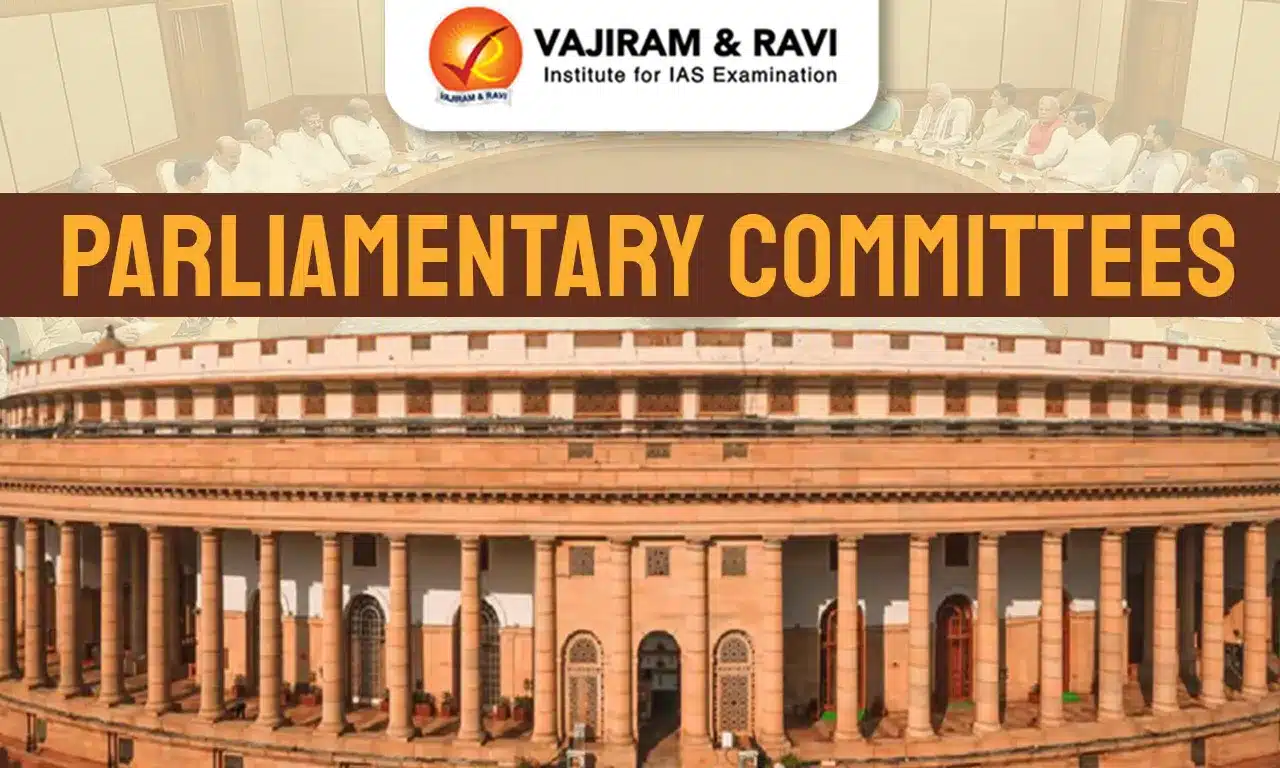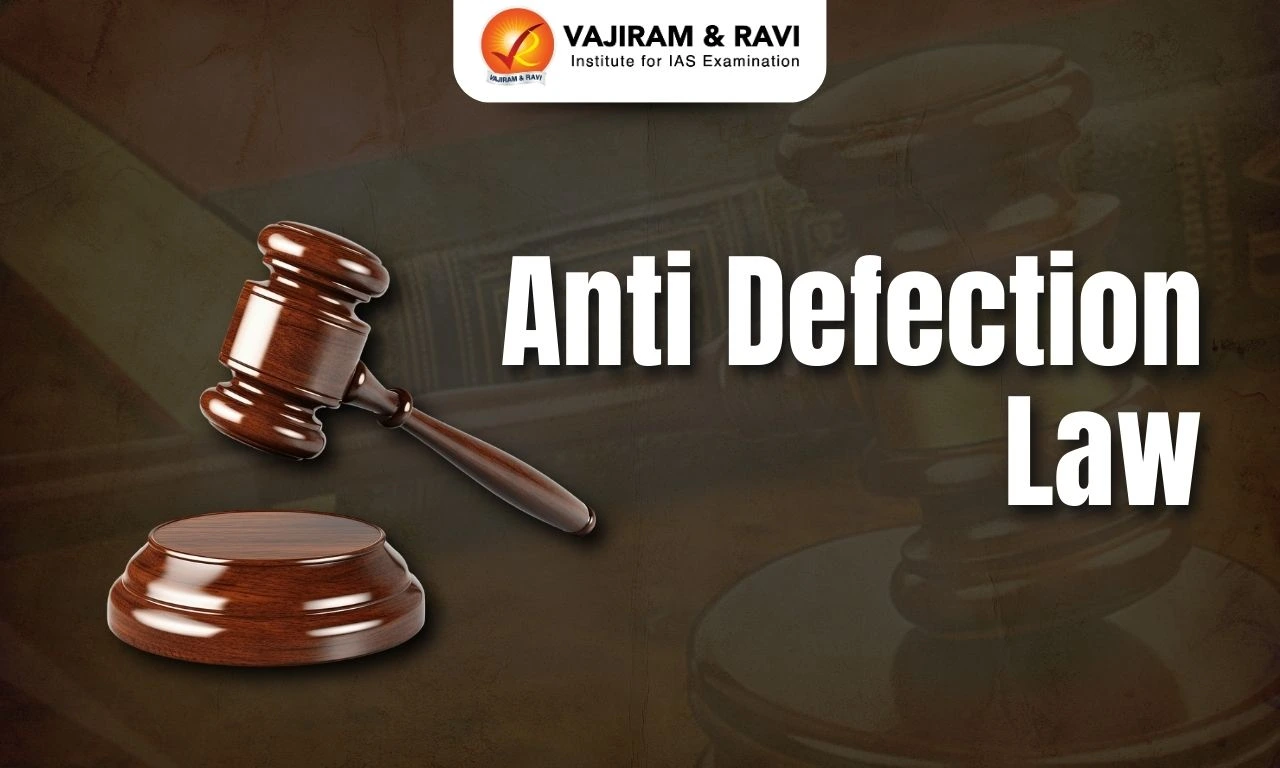What is a Parliamentary Committee?
A Parliamentary committee is a committee of Members of Parliament (MPs) who are elected or appointed from amongst the members of the house or nominated by the Speaker or Chairman. The concept of Parliamentary committees originated in the British Parliament. These committees operate under the direction of the Speaker of Lok Sabha or Chairman of Rajya Sabha and present their findings and recommendations to the respective houses.
The Parliamentary committees draw their authority from the constitution.
- Article 105: Powers, privileges, etc., of the houses of Parliament and of the members and committees thereof.
- Article 118: Each House of Parliament may make rules for regulations, subject to the provisions of this constitution, its procedure and the conduct of its business.
How are the Parliamentary committees classified?
By their nature, Parliamentary Committees in India are of two kinds:
- Standing committees.
- Ad hoc committees.
Standing committees
The Standing committees are permanent committees that are constituted by the Parliament to deal with specific areas of public policy or administration. These committees are constituted at the beginning of each session of Parliament and continue until the end of the session.
| Name of committee | Number of members | Tenure | Members nominated or elected |
|
30 | 1 year | Elected by the Lok sabha |
|
22 (15LS + 7RS) | 1 year | Elected by the two houses |
|
22 (15LS + 7RS) | 1 year | Elected by the two houses |
| Committees to Inquire |
|
| Committees to Scrutinize and Control |
|
| Committees Relating to the Day-to-Day Business of the House |
|
| House-Keeping committees or Service committees |
|
| Departmental standing committees |
|
Ad hoc committees
- Ad hoc committees are temporary committees constituted for a specific purpose and for a limited period of time. These committees are usually constituted to consider and report on a specific bill or to inquire into a particular matter of public importance. These committees are dissolved once they have completed their work.
- Ad hoc committees can be divided into two categories:
- Inquiry committees
- Advisory committees
- The principal Ad hoc committees are the Select and Joint committees on Bills, Railway convention committee, Joint committee on food management in Parliament House Complex, etc.
What are the powers and functions of the Parliamentary committees?
Some of the power and functions of the Parliamentary committees:
- Reviewing and scrutinising the work of the government: Parliamentary committees examine the policies and programmes of the government and make recommendations for improvement.
- Power to summon ministers and officials: They have the power to call ministers and officials to testify before them and to ask them questions about their policies and actions.
- Examination of bills: Parliamentary committees play a key role in the legislative process by examining and reviewing bills before they are passed into law.
- To make recommendations: They can make recommendations for changes to the bill and ensure that it is consistent with the constitution and the laws of the land.
What is the significance of the Parliamentary committees?
The significance of the Parliamentary committees:
- Expertise and specialization: Parliamentary Committees are made up of members of Parliament who have specific expertise and knowledge in a particular area, such as finance, foreign affairs, or health.
- The committee on Health and Family Welfare studied the Surrogacy (Regulation) Bill 2016, which prohibited commercial surrogacy, but allowed altruistic surrogacy.
- Checks and balances: These committees act as a check on the power of the executive branch by scrutinizing government policies and holding the government accountable for its actions.
- Strengthen the laws: Over the years, the committees have immensely contributed to strengthening the laws passed by Parliament.
- The committee on Food and Consumer Affairs suggested several amendments, such as increasing penalties for misleading advertisements and making certain definitions clearer in Consumer Protection Act 2019.
- Budgetary oversight: The Departmental related standing committees (DRSCs) also examine the budget. Detailed estimates of the expenditure of all ministries are sent for examination to the DRCSs.
- Forum for building consensus: Committees provide a forum for building consensus across political parties. Committees have closed-door meetings, which allows them to discuss issues freely and arrive at a consensus.
- Public Engagement: Committees provide an opportunity for members of the public and organizations to engage directly with Parliament and contribute to the legislative process.
What are the issues and challenges pertaining to Parliamentary committees?
There are several issues and challenges that Parliamentary committees in India face. Some of these are as follows:
- Resource constraints: The technical support available to Parliamentary committees is limited to a secretariat that helps with matters such as scheduling meetings and note-taking.
- The National Commission to Review the Working of the Constitution (2002) highlighted the lack of research support and specialist advisors with the DRSCs.
- Lack of independence: Some committees face pressure from the government or other influential groups, which can compromise their independence and impartiality.
- Limited powers: These committees do not have the power to enforce their recommendations or to take disciplinary action against those who do not comply.
- Limited participation: Some committees struggle to attract sufficient participation from MPs, which can limit their effectiveness.
- During 2009–14, only 49% of members were present for meetings of the departmental-related standing committees.
- Political influence: Parliamentary committees can be subject to political influence and pressure from party leaders or other powerful groups. This can undermine the committee's independence and ability to carry out its work objectively.
- Poor number of sitting: During the first Session of the 17th Lok Sabha, Parliament sat only for 37 days. In the last 10 years, Parliament met for 67 days per year, on average.
- Lack of detailed scrutiny: Parliamentary committees lack detailed scrutiny, face challenges in conducting thorough and effective scrutiny.
- Only a limited proportion of the budget is usually discussed on the floor of the House. In the 16th Lok Sabha, only 17% of the budget was discussed in the House.
What are the suggestive measures to enhance the role of Parliamentary committees?
There are several measures that can be taken to enhance the role of parliamentary committees:
- Increase resources and time: To examine and review the policies and actions of the government, committees should be provided more time and resources.
- The National Commission to Review the Working of the Constitution (2002) recommended that funds should be allotted to assist these Committees in conducting inquiries, holding public hearings, and collecting data
- Enhance independence: Committees should be independent and not subject to pressure from the government or other influential groups.
- Increase public visibility: Make the work of committees more transparent and accessible to the public, such as by holding public hearings or publishing reports.
Increase participation: Encouraging greater participation from MPs in committee work, through measures such as providing additional incentives or resources.
Last updated on January, 2026
→ Check out the latest UPSC Syllabus 2026 here.
→ Join Vajiram & Ravi’s Interview Guidance Programme for expert help to crack your final UPSC stage.
→ UPSC Mains Result 2025 is now out.
→ UPSC Notification 2026 Postponed for CSE & IFS which was scheduled to be released on 14 January 2026.
→ UPSC Calendar 2026 has been released.
→ UPSC Prelims 2026 will be conducted on 24th May, 2026 & UPSC Mains 2026 will be conducted on 21st August 2026.
→ The UPSC Selection Process is of 3 stages-Prelims, Mains and Interview.
→ Prepare effectively with Vajiram & Ravi’s UPSC Prelims Test Series 2026 featuring full-length mock tests, detailed solutions, and performance analysis.
→ Enroll in Vajiram & Ravi’s UPSC Mains Test Series 2026 for structured answer writing practice, expert evaluation, and exam-oriented feedback.
→ Join Vajiram & Ravi’s Best UPSC Mentorship Program for personalized guidance, strategy planning, and one-to-one support from experienced mentors.
→ UPSC Result 2024 is released with latest UPSC Marksheet 2024. Check Now!
→ UPSC Toppers List 2024 is released now. Shakti Dubey is UPSC AIR 1 2024 Topper.
→ Also check Best UPSC Coaching in India
Parliamentary Committees FAQs
Q1. Can the recommendations of a parliamentary committee be rejected?+
Q2. Can members of the public participate in parliamentary committee hearings?+

















